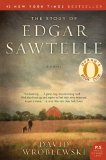Summary | Excerpt | Reading Guide | Reviews | Beyond the Book | Readalikes | Genres & Themes | Author Bio

A Novel
by David Wroblewski
She stayed in the living room with the baby while Gar led Almondine
to the workshop. Up and down the aisle the dogs stood in their pens. He
turned on the lights and tried to sketch out a plan on a piece of paper,
but his hands shook and the dimensions wouldn’t come out right. He
cut himself with the saw, peeling back the skin across two knuckles, and
he bandaged them with the kit in the barn rather than walk back to the
house. It took until midmorning to build a box and a cross. He didn’t
paint them because in that wet weather it would have taken days for
the paint to dry. He carried a shovel through the south field to the little
grove of birches, their spring bark gleaming brilliant white, and there
he dug a grave.
In the house they put two blankets in the bottom of the casket and
laid the swaddled baby inside. It wasn’t until then that he thought about
sealing the casket. He looked at Trudy.
“I’ve got to nail it shut,” he said. “Let me take it out to the barn.”
“No,” she said. “Do it here.”
He walked to the barn and got a hammer and eight nails and the
whole way back to the house he brooded over what he was about to do.
They’d set the casket in the middle of the living room. He knelt in front
of it. It had turned out looking like a crate, he saw, though he had done
the best he could. He drove a nail into each corner and he was going to
put one in the center of each side but all at once he couldn’t. He apolo-
gized for the violence of it. He laid his head against the rough wood of
the casket. Trudy ran her hand down his back without a word.
He picked up the casket and carried it to the birch grove and they
lowered it into the hole and shoveled dirt over it. Almondine, just a pup
at the time, stood beside them in the rain. Gar cut a crescent in the sod
with the spade and pounded the cross into the ground with the flat side
of the hammer. When he looked up, Trudy lay unconscious in the newly
greened hay.
She woke as they sped along the blacktop north of Mellen. Outside
the truck window the wind whipped the falling rain into half-shapes
that flickered and twirled over the ditches. She closed her eyes, unable
to watch without growing dizzy. She stayed in the Ashland hospital that
night and when they returned the following afternoon, the rain still fell,
the shapes still danced.
It so happened that their back property line lay exactly along the
course of a creek that ran south through the Chequamegon forest. Most
of the year, the creek was only two or three feet wide and so shallow you
could snatch a rock from the bottom without getting your wrist wet.
When Schultz had erected a barbed-wire fence, he dutifully set his posts
down the center of the stream.
Edgar and his father walked there sometimes in the winter, when only
the tops of the fence posts poked through the snowdrifts and the water
made trickling, marble-clicking sounds, for though the creek wasn’t wide
enough or fast enough to dissolve the snow that blanketed it, neither did it
freeze. One time Almondine tipped her head at the sound, fixed the source,
then plunged her front feet through the snow and into the icy water. When
Edgar laughed, even his silent laugh, her ears dropped. She lifted one paw
after the other into the air while he rubbed them dry with his hat and
gloves, and they walked back, hands and paws alike stinging.
For a few weeks each spring, the creek was transformed into a sluggish,
clay-colored river that swept along the forest floor for ten feet on
either side of the fence posts. Any sort of thing might float past in flood
season - soup cans, baseball cards, pencils - their origins a mystery, since
nothing but forest lay upstream. The sticks and chunks of rotten wood
Edgar tossed into the syrupy current bobbed and floated off, all the way
to the Mississippi, he hoped, while his father leaned against a tree and
gazed at the line of posts.
Excerpted from The Story of Edgar Sawtelle by David Wroblewski Copyright © 2008 by David Wroblewski. Excerpted by permission of Ecco, a division of Random House, Inc. All rights reserved. No part of this excerpt may be reproduced or reprinted without permission in writing from the publisher.
Your guide toexceptional books
BookBrowse seeks out and recommends the best in contemporary fiction and nonfiction—books that not only engage and entertain but also deepen our understanding of ourselves and the world around us.